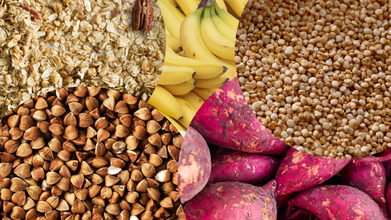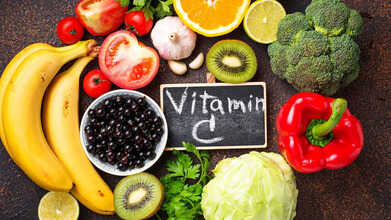- Health Conditions A-Z
- Health & Wellness
- Nutrition
- Fitness
- Health News
- Ayurveda
- Videos
- Medicine A-Z
- Parenting
- Web Stories
15 Easy High Protein Recipes That Anyone Can Cook

15 Easy High Protein Recipes That Anyone Can Cook
High-protein meals help in muscle building, increased metabolism, and generally a healthy life. It's easy to think that these healthy dishes require the skill of a professional chef or a whole day in the kitchen. That's not the case. Anyone can prepare delicious, high-protein meals with the right ingredients and a few simple tips.
Eating high-protein meals doesn't have to be a time-consuming affair. With these easy-to-follow recipes, you can enjoy your protein-packed dishes for every meal of the day without wasting hours in the kitchen. From the savory breakfast to the luscious dinners, there's a high-protein recipe for everyone. So why not try some of these recipes this week and see how easy it is to fuel your body with what it needs to stay strong and healthy?
Here are 15 high-protein, mouth-watering easy recipes for breakfast, lunch, dinner, and dessert. They will surely satisfy any meal plan whether a seasoned pro in the kitchen or a beginner. Try the savory omelet, the sweet crepes – there's something here to fit any of your diets.
High Protein Breakfast Recipes
1. Strawberry S'Mores Crepes with Chocolate Almond Butter
Who says you can't have a sweet breakfast while still getting your protein fix? These high-protein crepes, made with fresh strawberries, mini marshmallows, and chocolate almond butter, feel indulgent but are packed with muscle-building nutrients. They're perfect for a weekend treat that won't derail your fitness goals.
2. Sausage and Sweet Potato Breakfast Casserole
This hearty casserole is packed with protein from eggs and sausage, as well as a healthy dose from dark leafy greens, sweet potatoes, and coconut oil. Bake it on the weekend and have ready-made breakfast all week long. It's simple, filling, and full of flavor.
3. High Protein Overnight Oats
Overnight oats are a staple in high-protein breakfasts. You can prep this recipe in less than 10 minutes, and it will fuel you for the entire morning. Mix oats, protein powder, and your favorite toppings, and let it sit overnight. It’s an easy, no-cook option that's perfect for busy mornings or post-workout recovery.
4. Make-Ahead Breakfast Burritos
Breakfast burritos are a versatile and easy option for meal prep. Fill them with eggs, beans, or even extra egg whites for an added protein boost. Wrap them up, freeze them, and heat them when you’re ready. Don’t forget to add avocado for some healthy fats right before eating!
5. 2-Minute Omelet in a Mug
Running late? This 2-minute mug omelet is the answer for you. It's easy, quick, and highly packed with proteins. Just add your preferred fillings, such as spinach, cheese, or turkey for an excellent lunch option for someone who is always in a rush but does not want to compromise on their protein levels.
High Protein Lunch Recipes
6. Easy Poached Egg and Avocado Toast
Avocado toast just got a high-protein makeover. Poach an egg and top it on a slice of whole-grain toast with avocado. Add a sprinkle of fresh herbs and shaved parmesan to take it to the next level. It's a quick, satisfying lunch that's easy to prepare and packed with nutrients.
7. High Protein Balsamic Steak & Pasta Salad
Much better and healthier than those old versions involving mayonnaise, these are lean and filling options-lean sirloin steak accompanied by fresh asparagus will make for a diet-friendly lunch that's full of flavor. Make ahead for a no-hassle grab-and-go option.
8. Skinny Tuna Melt
This is a lighter take on the beloved tuna melt, packed with all the flavor you adore but with fewer calories. Coming in at 230 calories per sandwich, you can easily have two and pack in a whopping 56g of protein. It's the perfect solution for a satisfying lunch that doesn't weigh you down.
9. Steak & Grilled Cheese Sandwich
Indulge in a protein-packed grilled cheese with a twist. This version uses grilled sirloin steak, sautéed peppers, onions, and pepper jack cheese for a satisfying, high-protein lunch. It's a perfect way to enjoy comfort food without the guilt.
10. 3-Ingredient BBQ Stuffed Sweet Potatoes
For an easy, flavorful lunch, stuff baked sweet potatoes with shredded chicken breast and your favorite BBQ sauce. This meal is simple, yet satisfying and full of protein. The sweet potato adds a healthy dose of carbs to fuel your day.
11. Chili Lime Salmon Salad
Brighten up your lunch with a fresh chili-lime salmon salad. Packed with protein and omega-3s, this salad is light yet filling. You can meal prep it by keeping the components separate or pre-dressing the spinach for a ready-to-eat meal.
High Protein Dinner Recipes
12. Clean Kung Pao Chicken
This stir-fry recipe is an excellent dinner choice. It's sweet, spicy, and packed with protein from chicken. Customize the spice level to your preference by adjusting the chili paste and sriracha. Plus, it's quick and easy, so you won't be stuck in the kitchen for hours.
13. Roast Chicken Breasts with Garbanzo Beans, Tomatoes, and Paprika
This healthy, high-protein dinner of roasted chicken breasts, garbanzo beans, cherry tomatoes, and paprika is simple yet impressive. It's great to enjoy a flavorful dinner with minimal effort, and leftovers can even be shredded for pita sandwiches the following day!
14. Greek Marinated Chicken
Marinate chicken in Greek yogurt and a mix of spices for a delicious, moist dinner. This Greek-inspired dish is great with lemon orzo or wild rice and a green salad. However it's cooked, this chicken will make dinner a surefire win.
15. Easy Oven Fajitas
Fajitas do not have to be complicated. Simply season chicken in fajita seasoning and roast it with peppers and onions in the oven for an easy, high-protein meal. Serve with tortillas or over a bed of rice for a full, protein-packed dinner.
Are All Carbs Bad? Here Are 5 Healthy Carbs You Can Try

Credits: Canva
For years, people have been scared of carbohydrates. It is seen as the 'No-No' in the food world. Wherever you look round, if you want to lose weight, or get fit, you are often told to not consume carbohydrates.
The term carbohydrate itself has been cast as the villain of the nutrition world. Many popular diets and fitness trends often link them to weight gain, type 2 diabetes, and a host of chronic conditions. But nutrition experts stress that not all carbs are created equal.
While heavily processed foods loaded with sugar and refined flour do raise health concerns, there are many carbohydrate-rich foods are nutrient-dense, fiber-packed, and highly beneficial for overall well-being. In fact, they are healthy and even recommended. Often in the garb of what social media tells us, we miss them out. You would be shocked to know that some of the healthiest staples in our diets, from whole grains to tubers and fruits, fall into the high-carb category.
Here’s a closer look at five high-carb foods that not only provide energy but also deliver significant nutritional value.
Quinoa
Quinoa, often mistaken for a grain, is actually a seed classified as a pseudocereal. Over the past decade, it has become a star ingredient in health-conscious kitchens worldwide.
Cooked quinoa is about 70% carbohydrate, but its nutritional profile goes far beyond carbs. It offers a balanced combination of fiber, protein, and essential minerals. Studies link quinoa consumption to better blood sugar management and improved heart health, thanks to its abundance of plant compounds and antioxidants.
Another major advantage? Quinoa is naturally gluten-free, making it a popular alternative for those with wheat sensitivities. Its high fiber and protein content also make it particularly filling, which can support both weight management and digestive health.
Oats
Few foods embody the phrase “comfort and health” quite like oats. Known as one of the healthiest whole grains, oats deliver a rich blend of vitamins, minerals, and antioxidants.
Raw oats are about 70% carbohydrate, with a single cup providing 54 grams of carbs—including 8 grams of fiber. Of special note is beta-glucan, a type of soluble fiber unique to oats that has been extensively studied for its heart-protective effects.
Research shows that eating oats regularly can lower cholesterol levels, reduce the risk of heart disease, and help manage blood sugar—particularly in people with type 2 diabetes. They’re also more protein-rich than most other grains, and their satiating quality makes them an excellent choice for weight management.
Buckwheat
Despite its name, buckwheat has no relation to wheat and is entirely gluten-free. Like quinoa, it belongs to the pseudocereal family and offers a nutritional punch that rivals traditional grains.
Raw buckwheat contains 75 grams of carbohydrates per 100 grams, while cooked groats contain nearly 20 grams. Beyond its carb content, buckwheat is rich in protein, fiber, and an impressive array of antioxidants and minerals.
Early studies suggest it may support heart health by improving blood pressure and cholesterol levels, as well as aiding blood sugar control, an especially valuable benefit for people at risk of diabetes. Its versatility in both sweet and savory dishes also makes it a practical choice for everyday meals.
Bananas
Bananas have long been a go-to snack for athletes, children, and anyone in need of quick energy. A large banana provides about 31 grams of carbohydrates, primarily from natural sugars and starch.
But bananas aren’t just about energy. They’re packed with potassium, vitamin C, and vitamin B6, along with helpful plant compounds. High potassium levels are particularly beneficial for heart health, helping to regulate blood pressure and support proper muscle and nerve function.
Interestingly, the ripeness of a banana changes its nutritional makeup. Green, unripe bananas contain more resistant starch, a type of carbohydrate that acts like fiber, feeding beneficial gut bacteria and supporting digestive health. As bananas ripen, starch turns into natural sugars, making them sweeter but less fibrous. Both versions, however, have health benefits.
Sweet Potatoes
Vibrant, versatile, and naturally sweet, sweet potatoes are another carbohydrate-rich food with outstanding nutritional value. A half-cup serving of cooked sweet potatoes with skin provides about 21 grams of carbohydrates, along with fiber, sugar, and starch.
They also contain key vitamins and minerals, particularly vitamin A (in the form of beta-carotene), vitamin C, and potassium. These nutrients play essential roles in vision, immunity, and overall cell health.
Perhaps most impressive, sweet potatoes are loaded with antioxidants—compounds that fight free radicals and may reduce the risk of chronic diseases like cancer and cardiovascular conditions. Their natural sweetness also makes them a healthier alternative to refined carb-based desserts or snacks.
Should You Rethink What Carbs Mean?
The bad reputation surrounding carbohydrates often overlooks a crucial fact: carbs are the body’s primary source of energy. What matters most is the type of carbs consumed. Refined, sugar-laden options offer little nutrition, while whole-food sources like quinoa, oats, buckwheat, bananas, and sweet potatoes deliver fiber, vitamins, minerals, and powerful antioxidants.
For most people, there’s no need to shun high-carb foods. Instead, the focus should be on choosing unprocessed, nutrient-dense varieties that nourish the body while providing steady energy.
As nutrition experts continue to emphasize, balance and quality, not restriction, are the true keys to a healthy diet.
Soaked vs. Dry Raisins: Nutritionists Reveal Which Packs More Benefits

Credits: Canva
Raisins, made by drying grapes, are a popular snack loved for their natural sweetness and nutrient content. While people enjoy them both dry and soaked, how you consume them can influence not only their taste but also the health benefits they provide.
Incorporating soaked raisins into your daily routine is simple and versatile. You can enjoy them plain in the morning, mix them into your breakfast oats or yogurt, or even add them to smoothies and salads. Just a small handful can make a noticeable difference in energy levels, digestion, and overall vitality. Over time, this small change can support long-term wellness, making soaked raisins an easy and effective addition to a balanced, health-focused lifestyle. So which option is truly better for your body, soaked or dry raisins?
To get some clarity, we spoke with Celebrity Ayurvedic Nutritionist Shweta Shah, founder of Eatfit24/7, who explained which form offers more advantages for overall wellness.
Soaked vs. Dry Raisins: What’s Healthier?
Raisins are packed with nutrients like iron, antioxidants, and natural sugars that support general health. According to Ayurveda, soaked raisins tend to offer greater benefits than dry ones. Nutritionist Shweta Shah shared why this is the case and when dry raisins might still be useful.
Soaking raisins overnight can unlock their full nutritional potential. Shah explains, “Dry raisins contain phytic acid, which can prevent your body from absorbing important minerals like calcium and iron. Soaking helps reduce this effect, allowing your body to take in nutrients more effectively.”
Benefits of Soaked Raisins:
- Better Nutrient Absorption: Soaking reduces phytic acid, making minerals like iron and magnesium easier for the body to absorb.
- Easier Digestion: Soaked raisins soften and are gentler on the stomach, making them ideal to eat on an empty stomach in the morning. “They help stimulate digestive fire without causing excess heat in the body,” adds Shah.
- Cooling Effect: While dry raisins can have a warming effect, soaking them in water makes them cooling. This can help with acidity, constipation, and even skin issues.
- Supports Liver Detox: Soaked raisins or raisin water work as a mild detox, promoting better liver function, improved metabolism, and reduced toxin buildup.
When Dry Raisins Might Be Preferable
Although soaked raisins have many benefits, dry raisins also have their uses. Shah points out that they can be helpful in certain situations:- During cold weather, to provide natural warmth
- For people with strong digestion
- As a quick energy source while trekking, fasting, or during active routines
However, she warns that eating too many dry raisins, especially in hot weather, can cause heat-related issues like ulcers, skin irritation, and acidity.
In short, soaked raisins aren’t just a morning habit, they are an Ayurvedic tonic packed with cleansing, cooling, and nourishing benefits. As Shah notes, “Soaking raisins for 6–8 hours turns them into a powerful wellness booster that aids digestion, detoxification, and women’s health.” Whether you want to improve digestion, cool your system, or simply start the day on a healthy note, a handful of soaked raisins might be the perfect choice.
This Everyday Vegetable Has More Vitamin C Than Oranges To Fight Colds and Flu

Credits: Canva
If you are someone who loves vitamin C and often eats it to keep your viruses at bay, there is some good news for you, that there is a vegetable available that can do a much better job than an orange. Moreover, our diet plays a pivotal role in maintaining a robust immune system, which is responsible for warding off infections. If your immune system is healthy, you're less likely to get sick , and if you do catch a bug, your body will be better equipped to fight it off swiftly. Thus, Including the right amount of vitamin C in your daily diet is thought to help reduce the duration of colds.
This Vegetable Is More Beneficial Than Orange For Vitamin C
When it comes to getting enough vitamin C, oranges have reigned supreme as the go-to source. And with 70 milligrams of vitamin C in one medium-size navel orange, per the USDA, one orange is almost all you need to meet your daily dose (according to the National Institutes of Health, the suggested daily intake for vitamin C is 75 mg for women and 90 mg for men).
As per Mirror UK, Bell peppers contain 80.4mg of vitamin C per 100g, outstripping lemons, which have just 53mg for the same weight. Oranges also contain 53.2mg per 100g, while grapefruits offer 31.2mg. Incorporating a wide array of fruits into your diet is beneficial, and it's certain bell peppers are a great addition. So the experts now suggest, just a 50g serving can fulfil the daily advised intake of 40mg.
Importance Of Vitamin C For Body
Vitamin C is essential for the body because it serves as a powerful antioxidant, supports the immune system, and is crucial for the synthesis of collagen, which is vital for wound healing and the maintenance of healthy skin, bones, and blood vessels. It also enhances the absorption of iron from plant-based foods and protects cells from damage caused by free radicals, potentially reducing the risk of chronic diseases like cancer and heart conditions.
As per National Institute of health, Vitamin C is required for the biosynthesis of collagen, L-carnitine, and certain neurotransmitters; vitamin C is also involved in protein metabolism . Collagen is an essential component of connective tissue, which plays a vital role in wound healing. Vitamin C is also an important physiological antioxidant and has been shown to regenerate other antioxidants within the body, including alpha-tocopherol (vitamin E).
Because vitamin C can limit the damaging effects of free radicals through its antioxidant activity, researchers are examining whether it might help prevent or delay the development of diseases in which oxidative stress plays a role, such as certain cancers and cardiovascular disease (CVD). In addition to its biosynthetic and antioxidant functions, vitamin C plays an important role in immune function and improves the absorption of nonheme iron, the form of iron that is present in plant-based foods. Insufficient vitamin C intake causes scurvy, which is characterized by fatigue or lassitude, widespread connective tissue weakness, and capillary fragility.
While oranges remain a healthy choice, this often-overlooked vegetable proves to be an even stronger ally for your immune system. By adding it to your meals, you give your body an extra layer of protection during flu season. Simple changes like this can make a real difference in keeping colds at bay and maintaining good health year-round.
© 2024 Bennett, Coleman & Company Limited

